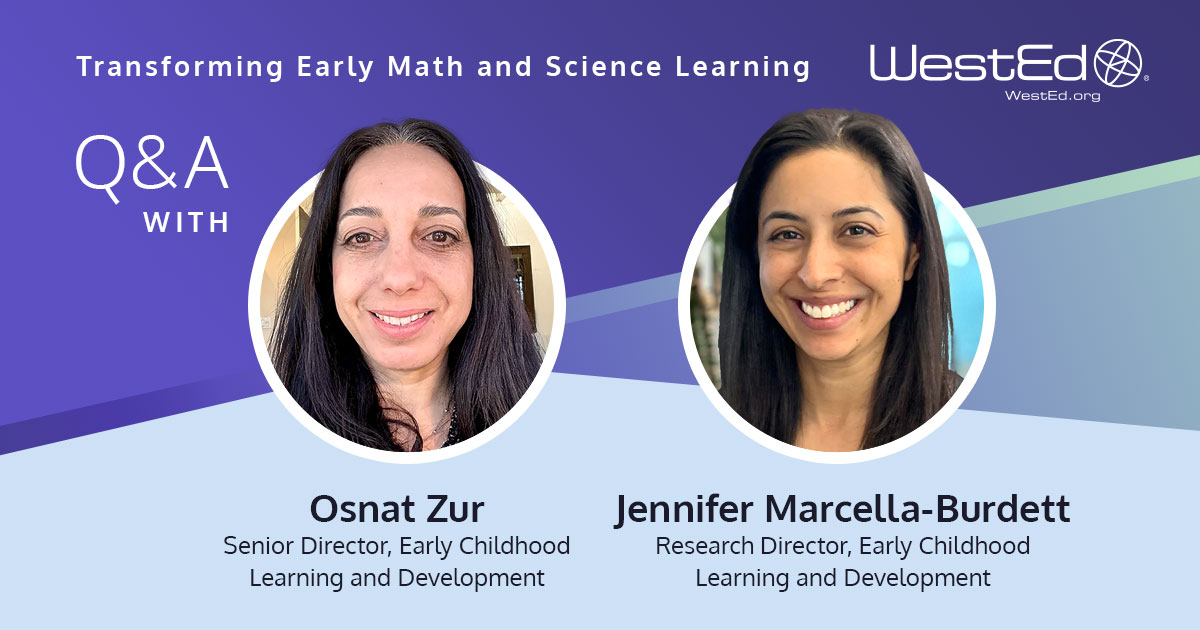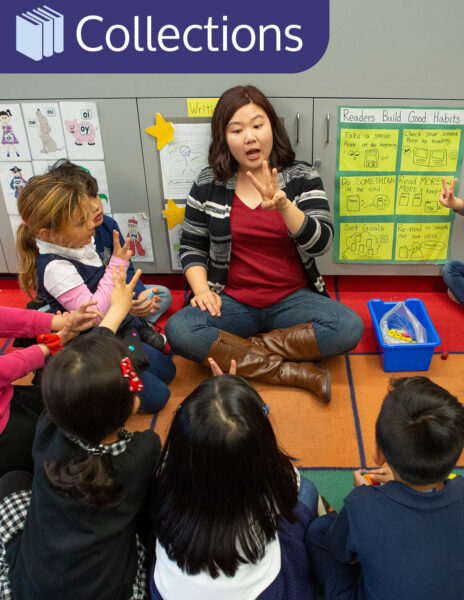
July 21, 2025
“I am not good at math. … I had built a wall in my head that didn’t allow me to teach math to staff. I have been managing and training early educators for over 15 years, and I rarely provided math training until now. [CPE] has changed me.”
—County Office of Education Facilitator
Math and science mindsets matter and lay the foundation for adults and children to succeed in these subjects. This principle is one of the four guiding principles of the Count Play Explore (CPE) initiative, a statewide effort in California promoting positive and confident math and science learning for children from birth through 3rd grade.
Research shows that early math skills are among the strongest predictors of later academic achievement in both math and literacy. Yet many educators struggle with math anxiety and a lack of confidence in teaching foundational math concepts.
To address this, the Fresno County Superintendent of Schools, in partnership with WestEd, developed suites of professional learning (PL) resources for the new Count Play Explore for Early Education website. Designed for PL facilitators, coaches, and other professionals working with educators of young children, these resources help spark the joy and the wonder of math and science for young learners and the adults who care for and educate them.
WestEd also led the evaluation of the initiative. Facilitators from 25 California agencies reported greater confidence in providing PL to educators in their local communities after participating in CPE’s PL and coaching. Participants showed math mindsets that were more positive, a deeper understanding of early math development, and increased confidence in their training and coaching practices.
In this Q&A, Early Childhood Learning and Development Director Osnat Zur and Research Director Jennifer Marcella-Burdett discuss the development and impact of CPE and offer insights for other states looking to strengthen early math education.
Osnat: The Count Play Explore initiative rests on four guiding principles—math and science are for everyone, they’re everywhere, they’re playful, and mindsets matter.
These principles fundamentally shape CPE’s PL experiences by ensuring we consistently focus on building positive math identities and mindsets rather than just delivering content knowledge.
Every PL component, whether it’s intensive training, coaching, or community of practice sessions, is designed around these principles. We prioritize joyful, hands-on exploration that helps participants overcome negative past experiences with math. We use adult learning principles that connect to participants’ real practice and provide ongoing reflection and feedback opportunities.
The principles ensure that CPE’s PL addresses the whole person—their feelings, attitudes, and barriers from past experiences, not just their technical knowledge. This creates learning experiences that are meaningful, collaborative, and transformative, ultimately building educators’ confidence and capacity to provide positive early math experiences for children.
The impact is PL that removes barriers, builds belonging, and creates sustainable change across multiple levels—from individual mindsets to agencywide capacity for supporting early math learning.
Jennifer: First and foremost, CPE aims to support positive math mindsets and a sense of belonging in math for all, including adult learners who are PL facilitators. The PL facilitators who participated in CPE’s training come with varied mathematical backgrounds. While some had positive childhood experiences with math, others don’t see themselves as “math people,” or they experience math anxiety.
CPE engages the facilitators in PL, which allows for them to have active, playful learning experiences that help break down some of those negative feelings that they hold about math. The initiative also offers concrete resources, including PowerPoint presentations, videos, adult learning activities, activities for children, reflection opportunities, and handouts with teaching practices that facilitators can flexibly use in their local communities to train educators and promote early math and science learning.
Jennifer: Facilitators who have experienced CPE can use the playful adult learning experiences and the reflection opportunities with educators in their local communities. Providing a space for teachers to experience joyful math learning as part of a PL session and the opportunity to reflect on those experiences helps break down any negative feelings about math they may have.
We know from research on early childhood educators that when teachers experience math anxiety, they spend less instructional time on math, which can influence children’s ability to engage in early math experiences. So, this kind of research shows us how important it is to really start with that foundation of the math mindsets of teachers. In our previous work with CPE, educators have qualitatively shared with us that since their participation in CPE, they’re doing more math in their classrooms; they’ve also observed children engaging in math experiences more spontaneously using more math vocabulary or showing more persistence in math tasks.
In our next phase of evaluation for CPE, we will conduct a math impact study in which we will measure some of these shifts in children’s attitudes about math and engagement in math to learn more about the impact of the initiative on children. Children don’t naturally have anxiety about math. They enter the world very curious about math and will apply math in their everyday play in routines. And the CPE Initiative helps continue those opportunities for children to explore math in their everyday lives, in their early childhood settings, and with their early childhood teachers.
Jennifer: Count Play Explore for Early Education provides self-study modules for facilitators to build their own capacity related to topics such as positive math mindsets or early math coaching. And there’s also entire suites of resources that offer a series of PL sessions for educators on a range of math topics. Soon, these resources will include a focus on science; computer science; and an integrated approach to science, technology, engineering, the arts, and mathematics (STEAM).
Overall, these PL resources have the potential to support school readiness because they offer content that focuses on how children develop and learn in math, science, and computer science, as well as effective teaching practices to support children in these areas. They offer rich examples through videos; hands-on, playful adult learning experiences; and examples of activities that teachers can use with children in their early learning settings.
All CPE resources promote an inquiry-based approach to exploring math, science, and computer science, which can support children’s development in these domains of learning and in other areas such as language and literacy, social and emotional development, and approaches to learning. Providing young children with engaging, personally meaningful opportunities to explore math, science, and computer science concepts also helps contribute to children’s sense of identity and belonging in these content areas. This foundation is essential for helping them see future careers in STEAM as real possibilities.
The content in CPE’s PL resources is based on research on children’s development in math, science, and computer science, as well as effective teaching practices to support children’s development in these areas. Whether based in California or another state, PL facilitators will find CPE’s resources valuable for delivering training or coaching on these topics.
Osnat The key questions are whether CPE is a replicable model that other states can adapt to build strong math foundations for young learners and what critical ingredients help move the needle.
We’ve learned that it’s possible to implement a statewide initiative that builds capacity among trainers and coaches while creating positive math mindsets. Several critical elements contribute to this success:
- Embracing a hands-on, playful approach: Presenting math through joyful, active exploration provides accessible entry points for educators regardless of their math background. When adults experience learning the same way we want children to—through play, collaboration, and hands-on materials—they build understanding and confidence naturally.
- Addressing mindsets directly: Don’t ignore feelings about math. Create space to acknowledge math anxiety or negative past experiences while building identity and belonging as math educators. The playful approach itself helps, but explicit attention to mindsets is crucial.
- Maintaining Implementation flexibility: Agencies adapt the initiative to their existing infrastructure, local priorities, and educator needs. We provide minimum requirements but let communities decide specific topics, delivery methods, and the best ways to leverage existing efforts like preschool through 3rd grade (P–3) initiatives.
- Sustaining intensity over time: One-time professional development doesn’t work. Educators need multiple related sessions over time, with those receiving more hours showing greater confidence and curriculum integration. Ongoing coaching significantly enhances impact compared to training alone.
- Differentiating support based on experience: Tailor PL to educators’ prior experiences. New educators, as compared to those with more experience, need different approaches, as do those familiar with early childhood pedagogy compared to those new to developmentally appropriate math teaching.
Systemic change means looking beyond content knowledge and teaching techniques to transform how everyone in a child’s world approaches early math. We need to build educator confidence, shift mindsets, create supportive cultures within agencies, and develop local capacity that lasts. CPE’s model works because it addresses multiple levels of the system while maintaining focus on what matters most: creating rich, engaging, developmentally appropriate environments in which young children can explore and enjoy math and science learning. Investing in a comprehensive approach for improving early math education with sustained commitment can fundamentally shift how early math education happens at scale.
Reimagine early math and science education in your state with WestEd’s Early Childhood Development, Learning, and Systems team. Contact Osnat Zur for more information.










